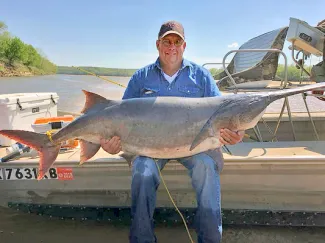
Larry Morphew of Yale snagged this paddlefish in the Arkansas River above Lake Keystone on April 29, 2018. The Oklahoma Department of Wildlife Conservation has certified it as the new rod-and-reel state record at 132 pounds, 8 ounces.
Weighing 132 pounds 8 ounces, the paddlefish snagged Sunday, April 29, by Larry Morphew has been certified as Oklahoma’s newest rod-and-reel state-record paddlefish by the Oklahoma Department of Wildlife Conservation.
After Morphew’s monster was officially checked and weighed by North Central Region Fisheries Supervisor Bill Wentroth, the angler released the record fish back into the Arkansas River near Blackburn. It beats the previous record by 7 pounds, 1 ounce.
Remarkably, the Yale resident said this was his first paddlefishing trip, his first paddlefish catch ever, and he snagged it on his first cast of the day.
According to media reports, Morphew's fish was at least 7 feet long from the tip of the rotstrum to the tip of the tail. But for record fish, the length of a paddlefish is measured from the eye to the fork in the tail. Officially the length of the fish was 65 inches, and the girth was 39 inches.
Oklahoma is viewed as the top destination for anglers who want to try snagging for these large primitive fish that are found in Oklahoma primarily in the Red, Arkansas and Grand river systems. The Wildlife Department’s Paddlefish Management Program is recognized across the nation as a resounding success.
The previous rod-and-reel state-record paddlefish was caught in the Arkansas River in April 2011 by Aaron Stone of Pawhuska. It weighed 125 pounds 7 ounces.
Charles Ham of Grove still holds the state record for the largest paddlefish caught and reported in Oklahoma. His unrestricted division state-record fish weighed 134 pounds when he snagged it on a trotline in Grand Lake in August 1992.
Nationally, paddlefish range from Louisiana to Montana. But Oklahoma's paddlefish resource wasn’t always as robust as it is today.
In 1992, fisheries biologists began an effort to re-introduce paddlefish to state waters where they had become locally eradicated, using hatchery-raised fish. This allowed self-sustaining populations to become established in many areas. In February 2008, the Wildlife Department opened the Paddlefish Research Center (PRC) near Miami, Okla. The center operates in March and April each year to collect important biological data, process paddlefish fillets for anglers and salvage paddlefish eggs.
Each fish is examined to gather details about the health of the paddlefish population. Then eggs are harvested from the female fish, processed into caviar, and sold in world markets. Caviar proceeds are used to fund continued paddlefish research and improve angler access, along with other fish and wildlife conservation activities.
This model program allows biologists to get scientific information they need to make sound management decisions, provides anglers with the meat from their fish, and creates revenue from the salvaged eggs to pay for continued management of the resource. It is a win-win scenario for anglers and for paddlefish.